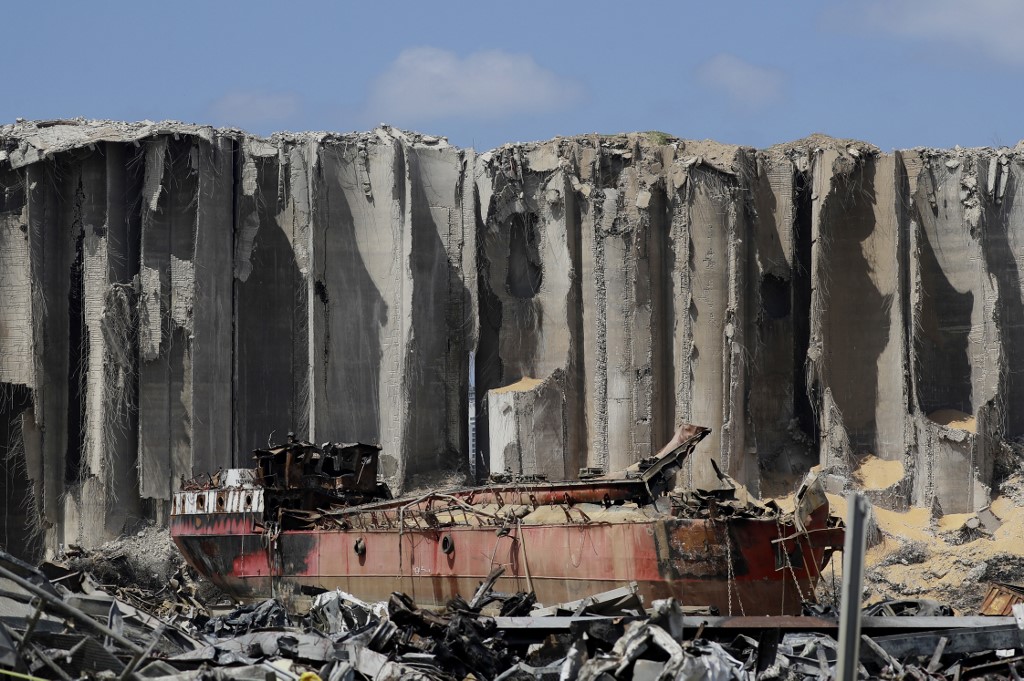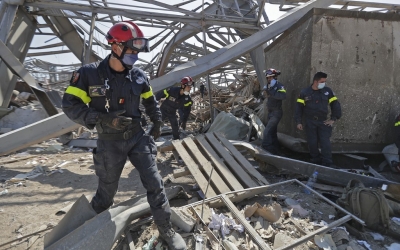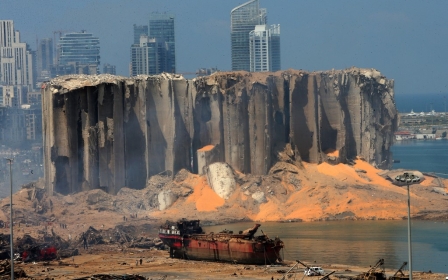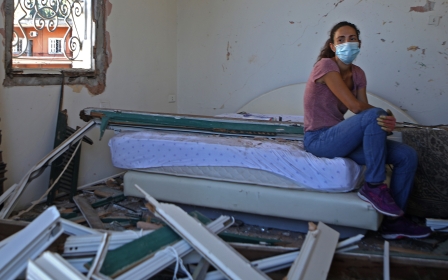Beirut explosion: The missing Lebanese link
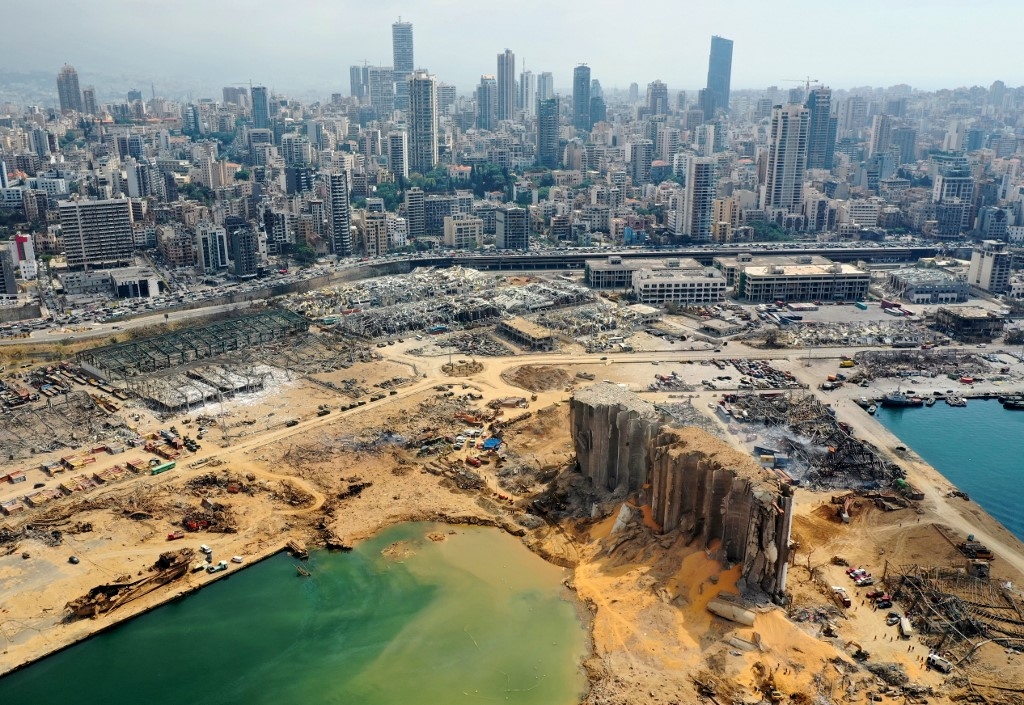
In the immediate aftermath of the Beirut port blast last month, we have seen concerted efforts by principal political actors in Lebanon to diffuse and deflect responsibility.
Different parties have accused one another of corruption in relation to the mishandling of the ammonium nitrate shipment at the port. The prime minister (who has now resigned) denied previous knowledge of the situation. The president’s son-in-law, Gebran Bassil - who has strong connections with the head of the customs department, Badri Daher - quickly sought to focus attention on those outside of Lebanon involved in the initial shipping of the chemicals.
A month after the blast, around 25 people have been arrested or placed under investigation, including the head of the customs department and his predecessor, as well as officers and employees in the port authority and, lately, the three workers who were called to do the maintenance in warehouse 12.
The investigation is clearly limited to the port and, up until now, none of the ministers of work and travel, or the prime ministers or presidents who were fully aware of the presence of explosive materials, have been called for interrogation, let alone arrested.
More questions
New MEE newsletter: Jerusalem Dispatch
Sign up to get the latest insights and analysis on Israel-Palestine, alongside Turkey Unpacked and other MEE newsletters
One month into the investigation, there are more questions than answers.
On Tuesday, the judge overseeing the investigation questioned four security officials who were based at the port and issued arrest warrants for them, the state-run National News Agency said.
The four are an army intelligence brigadier general, a major with the State Security agency and two majors with the General Security Directorate.
A Lebanese official told Reuters last month that the initial investigations indicated that years of inaction and negligence over the storage of highly explosive material caused the explosion.
In a Guardian article published earlier last month, Professor Laleh Khalili argued that one should look beyond the Lebanese state and society to the world of international shipping in order to understand where the core responsibility for this disaster lies.
None of the ministers or the prime ministers or presidents who were fully aware of the presence of explosive materials have been called for interrogation, let alone arrested
The article is very informative on how the world of international shipping works, but the analysis offers little on the specific case of Lebanon - and, in fact, risks misplacing responsibilities.
While understanding global capitalism is always helpful in sharpening our analyses of phenomena shaped by this system, sometimes - as in this case - such analysis can end up diffusing responsibility and make it harder for people in specific localities to act.
In her article, Khalili argues that “while attention and anger has focused on the incompetence and dysfunction of the Lebanese government and authorities, the roots of the catastrophe run far deeper and wider - to a network of maritime capital and legal chicanery that is designed to protect businesses at any cost”.
This directly shifts attention away from Lebanon to a world of shipping that is global in scope. The only place that Lebanon figures into this analysis is through its incompetence and dysfunction, with the “incompetence” of Lebanese authorities repeatedly emphasised.
Enforcing laws
It is not actually clear that this argument about a lawless world of international shipping fully holds. In the case of Beirut, port authorities successfully enforced the law through impounding the ship in question, and Lebanese courts successfully secured the release of the sailors caught in the middle of the conflict within a year of the case beginning.
The lawlessness of international shipping seems to be relevant mostly outside of Lebanon, with the ease of the shipowner declaring bankruptcy, abandoning the ship and avoiding responsibility.
One underlying assumption in Khalili’s article is that the ship carrying ammonium nitrate from Georgia to Mozambique had no strong ties to Lebanon, besides making a brief stop in Beirut. This might or might not be true, and there are many questions that must be asked and investigated before we accept this assumption.
Was the ship really going to Mozambique? Lebanese authorities claim they contacted the government of Mozambique several times, and the latter declared it had no information about the ship. When the ammonium nitrate was unloaded in Beirut, port authorities in Mozambique denied any knowledge of the ship.
What role did the Russian businessman, Igor Grechushkin, who is regarded as the ship’s de facto owner, play? He bought the ship in the same year and made its only trip from Georgia to Turkey, and then to Beirut. Who are the creditors who hired the law firm Baroudi and Associates and filed legal claims against the vessel, which were responsible for keeping the ammonium nitrate in the port of Beirut?
Who orders this amount of a valuable product and then does not seek to claim it back? Do any of these actors have substantive links with groups in Lebanon, or is the fact that this played out in Beirut purely incidental, with the population of Beirut suffering collateral damage from a system that, as Khalili suggests, is principally global in nature and not directly linked to the internal political conflicts of Lebanon?
Political control of the port
A further set of questions must be asked about the political control over the Port of Beirut, and the relationship of local political agendas and actions to the 4 August disaster.
In Khalili’s article, the only Lebanese actors named are Lebanese port authorities and the judge who ordered the release of the ship’s crew. But if we are to understand how the world of international shipping plays out in Lebanon, our analysis cannot stop at the port of Beirut.
Legally, we know that the Lebanese transport ministry, as well as port management, play a direct role in decisions around the port. We also know that informally, other groups also play a strong role. There is a presence of the Lebanese army and, lately, state security.
Hezbollah denies having anything to do with the port. “We do not manage the port, we do not control it … we do not interfere with it, we do not know what was going on inside it or what is there,” the movement's secretary general, Hassan Nasrallah, said in a televised address. Yet, at least four of the customs regional directorate of Beirut are related to the party and the Amal Movement headed by Parliament Speaker Nabih Berri.
Other port officials belonged to former Prime Minister Saad Hariri's Future Movement and President Michael Aoun's party, the Free Patriotic Movement.
The investigation should have looked into the roles, interests and agendas of the various actors within Lebanon regarding the ship. Is there any evidence that any of them took advantage of the international world of global shipping, as described by Khalili, in pursuit of their own local, national and regional interests?
We know that port authorities sent more than five letters to the Judge of Urgent Matters, ministers and political leaders to request the removal of the ammonium nitrate. Why was nothing done? Was it just about incompetence?
Perhaps. But it is also entirely possible that other agendas were involved. We know that port authorities had the legal right to sell the ammonium nitrate. If it was a question of profit, then why not sell the stored ammonium nitrate for millions of dollars? Is this just local incompetence in the context of global lawlessness?
Diverting blame
Finally, there is the question of the ammonium nitrate itself: if the ship had been carrying a cargo of ladies’ gloves or children’s bath toys, then all of the workings of the world of international shipping would presumably never have had the same significance as they did in this case.
It is notable that in Khalili’s article, which ties the responsibility for the disaster to the world of international shipping, the discussion of ammonium nitrate is linked with the world of global terrorism: the 1993 London bombing and the 1995 Oklahoma City bombing. It was also used in the IRA's Manchester bombing of 1996 and many other places.
Were any groups acting on their own interests around ammonium nitrate, once they became aware of its presence in the Port of Beirut?
Is it certain that the ammonium nitrate arrived in Beirut purely accidentally and remained there purely through local incompetence and international shipping lawlessness? Or was political agency involved? At this point, we don’t know, but the question needs to be asked and carefully investigated.
Were any Lebanese groups involved in the initial shipping of the ammonium nitrate? Or were any groups acting on their own interests around ammonium nitrate once they became aware of its presence in the Port of Beirut?
As the investigation proceeds slowly, we might never know what exactly happened on 4 August at the port.
And while we do need to consider the role played by the international shipping regime in this disaster, it must be in combination with a close and careful consideration of how this global system interacted with actors in Lebanon itself.
The views expressed in this article belong to the author and do not necessarily reflect the editorial policy of Middle East Eye.
This article is available in French on Middle East Eye French edition.
Middle East Eye delivers independent and unrivalled coverage and analysis of the Middle East, North Africa and beyond. To learn more about republishing this content and the associated fees, please fill out this form. More about MEE can be found here.



